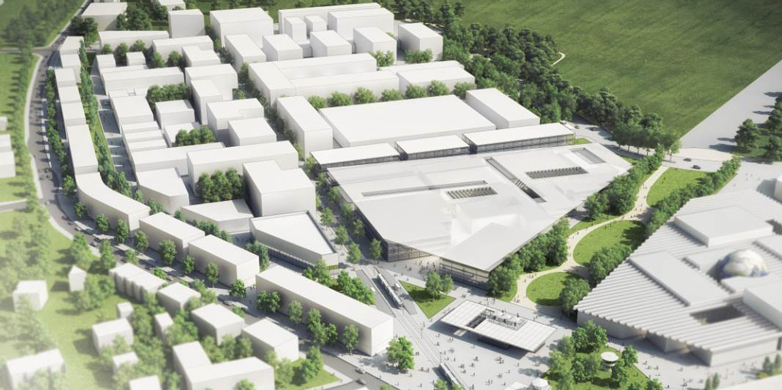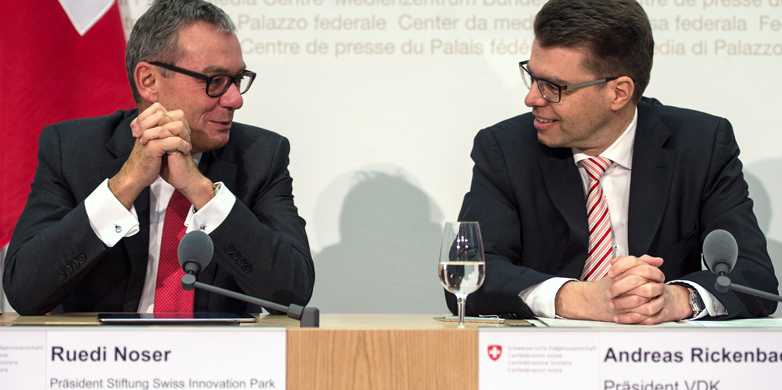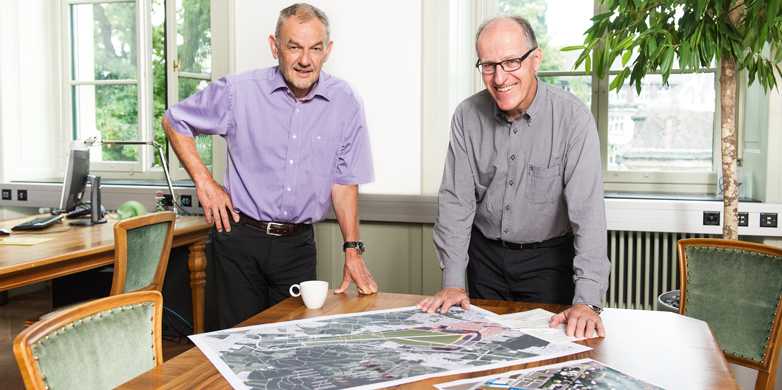Broad support for the Innovation Park in Dübendorf
The Federal Council is pushing ahead with the Swiss Innovation Park: it intends to make 350 million francs available and give the operators land with planning permission. ETH Zurich has been supporting the project for over ten years.
Starting in 2016, a Zurich Innovation Park is to be built in Dübendorf. It is part of the national innovation park in Switzerland. The aim is for the results of university research to be translated into marketable products as quickly as possible, in partnership with international companies. ETH Zurich has been supporting the idea since 2004 by helping with planning and carrying out comparative and feasibility studies. In September 2014 the Federal Council gave the Innovation Park approval in principle.
Last Friday, the ambitious project took another important step closer to becoming reality: the Federal Council submitted a Dispatch to Parliament on the organisation of, and support for, the Swiss Innovation Park. The 54-page Dispatch summarises all the preliminary work that has been carried out by the cantons, universities and private sector and describes the actual structure of the Swiss Innovation Park.
For Roman Boutellier, Vice President of ETH Zurich and Professor of Innovation and Technology Management, the Dispatch marks an important breakthrough: “The conditions are now in place for Switzerland to become Europe’s centre for innovation.”
The Federal Council intends to support the intergenerational project in two specific ways: firstly, with temporary framework credit of 350 million francs to stand surety for earmarked loans. This will enable the newly established “Swiss Innovation Park” Foundation (see text box) to raise capital on preferential terms that can be used to grant loans for advance funding of the research infrastructure. Secondly, a decision in principle should enable land owned by the federal government to be released with planning permission for the Innovation Park. This includes, among other sites, part of the military airfield at Dübendorf.
Setting the political agenda
It was the FDP National Councillor Ruedi Noser who first brought the idea of an Innovation Park on the Dübendorf site into the political arena. He submitted a proposal in 2007 and asked the Federal Council to comment on the idea. Since then, he has worked tirelessly to see the Park developed.
Noser is therefore looking forward to the next stage that has just begun with the submission of the Federal Council’s Dispatch to Parliament. “Now the framework conditions are in place for the hub and network locations of the Swiss Innovation Park to press on with their work as fast as possible.”
They will be supported in this by the newly established Swiss Innovation Park Foundation, which is preparing for the Innovation Park to commence operations in 2016. As President of the Foundation, Noser especially wants to attract interested parties from the private sector all over the world, to safeguard the quality of the research and development work here.
“We don’t want Dübendorf to be just another office park but to be a hub for world-class research at the highest level.” Noser regards the funding that has been guaranteed to the Foundation by the private sector for the next ten years as a good omen: “Private industry has shown that the success of Switzerland as a centre for innovation is important to it.”
Two hub locations, two network locations
The Swiss Innovation Park will start with two hub locations near the two ETH sites in Lausanne and Zurich and two network locations in the canton of Aargau and in Northwestern Switzerland. A follow-up analysis initiated by the Department of Economic Affairs, Education and Research is currently being carried out to identify if there should be any further network locations. The National Council and Council of States are expected to debate the Federal Council’s Dispatch over the coming year.
Ruedi Noser is optimistic that the Dispatch will get through the two chambers unchanged: “The prospects look good, because the Dispatch has been thoroughly negotiated with the cantons involved and there is now nationwide consensus on the need for an Innovation Park.”
The “Swiss Innovation Park” Foundation
The Swiss Innovation Park Foundation was set up at the same time as the Federal Council’s Dispatch was submitted to Parliament. Its founders are the Swiss Innovation Park Association, the Conference of Cantonal Directors of Economic Affairs (VDK), the canton of Zurich, the SIP West EPFL Association, the canton of Aargau, the SIP Northwestern Switzerland Association and the two business organisations Economiesuisse and Swissmem. The operations of the Foundation will be funded by prestigious Swiss companies for a maximum of ten years.
Over the coming months, the Foundation will be establishing the framework in terms of personnel, organisation and structures for starting its operational work as the national sponsor. At the same time, the Swiss Innovation Park Association will be supporting the implementation of the Research and Innovation Promotion Act (RIPA) and the establishment of sponsorship for a Swiss Innovation Park. It is made up of high-profile individuals and organisations in the fields of business, politics, academia and administration.



